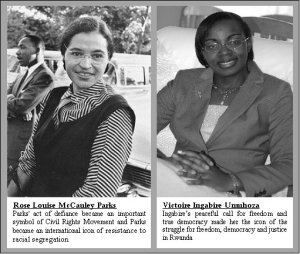 Within a period of nearly a year Rwanda political landscape has experienced fundamental changes which could seem impossible to imagine for a non informed observer. I remember listening to someone who had been to that country not long ago saying that he didn’t believe that there could be people under Paul Kagame rule who could overcome their fear for his regime and dare to come out publicly and oppose his policies. My interlocutor was referring to the protest held in Kigali on 24th June 2010 that opposition leaders led to show their dissatisfaction on their exclusion from the presidential elections by the Rwandan electoral commission. Everyone can remember how the demonstration was brutally crashed and then some of the opposition political leaders immediately imprisoned, including Me Bernard Ntaganda, Chairman of PS-Imberakuri, who since then has been in jail.
Within a period of nearly a year Rwanda political landscape has experienced fundamental changes which could seem impossible to imagine for a non informed observer. I remember listening to someone who had been to that country not long ago saying that he didn’t believe that there could be people under Paul Kagame rule who could overcome their fear for his regime and dare to come out publicly and oppose his policies. My interlocutor was referring to the protest held in Kigali on 24th June 2010 that opposition leaders led to show their dissatisfaction on their exclusion from the presidential elections by the Rwandan electoral commission. Everyone can remember how the demonstration was brutally crashed and then some of the opposition political leaders immediately imprisoned, including Me Bernard Ntaganda, Chairman of PS-Imberakuri, who since then has been in jail.In some years’ time, when looking back, while historians maybe trying to explain how that overall political change occurred, I am confidently certain that they will not miss to highlight the importance of Ms Victoire Ingabire’s return to Rwanda and her stand on behalf of her political party FDU-Inkingi on a number of sensible issues for Rwanda and Rwandans. She has been hailed as contentious by the regime, and that resulted in her imprisonment on October 14th, 2010. But analysing objectively for example her claims in relation to reconciliation, injustice, inequalities, discrimination, poverty, there shouldn’t be any controversy about these issues since they concern more than a small minority of people. The reality is that a Kigali based Tutsi elite has monopolised everything from military and political structures to economic powers, and leaving rural Rwandans – more than 80 % completely marginalised under different forms in their own country.
On her first anniversary in Rwanda, nearly three months, or 25% of the overall period, will have been spent in prison, notwithstanding the fact that even while out she was either under house arrest or not free of going wherever she liked in Rwanda. But we can understand her imprisonment represents one of typical characteristics of African dictatorships where serious political challengers find themselves deprived of their freedom because they threaten the existence of the leaders who rule without clear and democratically proven mandate from their constituents. Though this could appear to be the norm under African skies, what is most shocking is seeing western countries claiming to support democratic principles shying away from distancing themselves from the Rwandan regime. Paul Kagame has demonstrated quite extensively his true colours when it comes to the rule of law and democracy. Following recent developments of Rwandan politics, which include the questionable imprisonment of Ms Victoire Ingabire, only Holland out of several European countries supporting Kigali, has been outraged and then took action against what seems to be a masquerade of justice, and after sufficient evidence of the criminality of the Rwandan regime as documented by the UN Mapping Report.
Ms Victoire Ingabire has early this year explained that ‘you cannot finish what you haven’t started.’ I would add that, ‘Nothing changes if nothing changes,’ which is the motto of a course a teacher put up to motivate his students. As she initiated change we are witnessing in Rwandan politics, Rwandans are called more than at any other time, to pursue and complete the task she started, which was and still is to bring back democracy, equality, ending injustices, and embedding the rule of law in every aspects of Rwandan lives. They should particularly take courage from her stand, make the necessary non violent sacrifices, as she has done so far and continue this in order to achieve that noble objective for the benefit of future generations.
As people, particularly Rwandans committed to working towards change in their country will soon commemorate the return of Ms Victoire Ingabire to Rwanda on 16th January 2011, though she may not be in her best posture at the time to celebrate, there should be a renewed engagement from them to her struggle for a better Rwandan nation, where all citizens have equal rights, can exercise all their fundamental human rights, and leaders rule with mandate from their constituents, and freedoms of expression and association are not seen as threats to national security but pillars for the country’s tolerance, strength and prosperity.


No comments:
Post a Comment